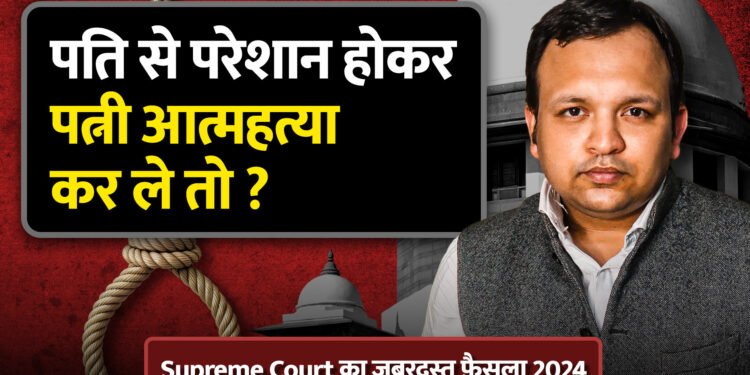Introduction:
In a landmark ruling, the Supreme Court of India clarified a critical aspect of criminal law, particularly under Section 306 of the Indian Penal Code (IPC). The Court discharged Jaydeepsinh Pravinsinh Chavda, the accused husband, of the charge of abetment to suicide, stating that mere harassment does not meet the threshold for convicting someone under the provision. This judgment is significant as it outlines the crucial elements required for establishing abetment to suicide and distinguishes it from mere allegations of cruelty or harassment.
To learn more about the topic, read the blog till the end, and if there lies any more doubt, feel free to reach out to us at; https://thelegalshots.com/legal-opinion/
Facts of the Case
In this case, Jaydeepsinh Pravinsinh Chavda was accused of abetting his wife’s suicide after she died by hanging herself following a marriage of 12 years. The complaint was filed by the wife’s father, alleging that the husband had subjected her to mental and physical cruelty, specifically related to the sale of her gold ornaments. The complainant claimed that the wife had been tortured when she demanded the return of her jewellery. The prosecution argued that the husband’s behavior had directly led to her taking her own life.
However, the Supreme Court found that the alleged incidents, including the harassment related to the ornaments, occurred nearly a year before the suicide. The Court observed that there was no direct link between the husband’s actions and the act of suicide. Even if the harassment allegations were true, the Court found that they did not meet the threshold necessary for a charge of abetment under Section 306 of the IPC.
Laws Explained
- Section 306 IPC (Abetment of Suicide):
- To establish abetment, the prosecution must prove that the accused intentionally provoked or incited the victim to commit suicide.
- Mere harassment or cruelty, without direct instigation or intent, does not satisfy the requirements for conviction under Section 306 IPC.
- Mens Rea (Intent):
- The Court emphasized that mens rea (criminal intent) is a necessary element for abetment. The accused’s actions must exhibit a deliberate intention to drive the victim to suicide.
- Section 498A IPC (Cruelty):
- While the Court discharged the husband from the charge under Section 306 IPC, it upheld the charge of cruelty under Section 498A IPC. Cruelty under this section includes any willful conduct likely to drive the woman to harm herself or her health.
Supreme Court’s Ruling
The Supreme Court’s ruling emphasized that a charge under Section 306 cannot be sustained merely on allegations of harassment. For abetment of suicide, it must be proven that the accused’s actions were directly linked to the victim’s decision to end their life. The Court made it clear that harassment alone does not meet the criteria of abetment under the law unless it can be shown that the accused’s actions left the victim with no alternative but to take their life.
In this case, the Court ruled that the alleged harassment related to the gold ornaments was not sufficiently proximate to the time of the suicide and, thus, could not be linked to the tragic outcome. The accused husband was therefore discharged from the charge of abetment of suicide. However, the Court upheld the charge of cruelty under Section 498A, reinforcing that harassment or ill-treatment can still constitute a criminal act, even if it does not directly lead to suicide.
Conclusion:
This judgment sheds light on the crucial distinction between civil wrongs, such as cruelty, and criminal actions like abetment of suicide. It underscores the importance of proving mens rea—the specific intent to provoke suicide—before a person can be convicted under Section 306 of the IPC. Mere allegations of harassment, however serious, are insufficient to sustain charges of abetment.
While the Court’s ruling provides a measure of clarity, it also reinforces the need for a more nuanced approach when dealing with complex issues like suicide. The ruling invites a deeper understanding of the difference between mental cruelty and actions that directly incite a person to take their own life.
My Point of View:
This judgment serves as a critical reminder of the need for clarity and evidence in criminal cases. While domestic cruelty and harassment should be dealt with severely, they must be proven with clear evidence, especially when it comes to sensitive charges like abetment to suicide. The Court has rightly highlighted the distinction between civil matters of cruelty and criminal cases of abetment to suicide, ensuring that only those who actively contribute to such extreme outcomes are held criminally liable.
Takeaways for Readers:
- Mens Rea is Crucial: In cases of abetment to suicide, the intent behind the accused’s actions is a vital factor. Mere allegations of harassment are not enough to establish criminal liability.
- Proof Beyond Doubt: The prosecution must establish a clear connection between the accused’s actions and the suicide, with evidence that directly links the two.
- Understanding the Law: Legal distinctions between civil and criminal matters are essential for the proper application of the law. Domestic disputes or harassment should be handled appropriately under the correct legal framework, whether criminal or civil.
This case highlights the importance of ensuring that criminal law is not misused for cases that do not meet the strict legal criteria, while still providing adequate remedies for victims of cruelty or harassment under the law.In cases involving suicide, mere allegations of harassment are insufficient to prove abetment. There must be clear, compelling evidence showing that the accused’s actions directly led to the victim’s tragic decision.
If doubts still persist, contact our Legal Experts at https://thelegalshots.com/legal-opinion/




